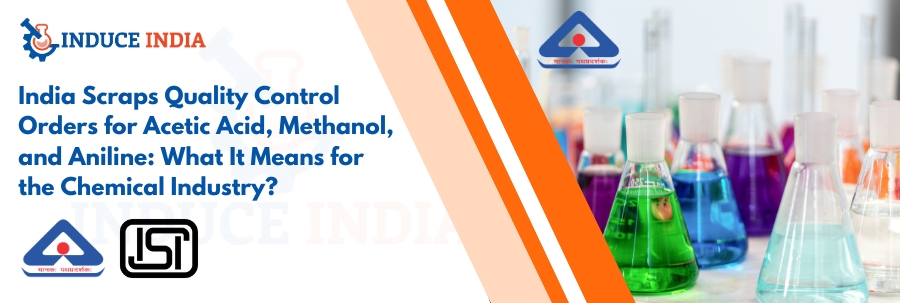The Centre’s decision to withdraw QCOs for three important chemicals—Acetic Acid, Methanol, and Aniline via notification on 23rd July, 2025, which created a terrific glare on the Indian chemical industry. These three chemicals were originally published in 2019, but their enforcement date was postponed repeatedly, with the latest date set for 5th August, 2025.
This is a landmark policy announcement and has triggered frantic discussions among manufacturers, importers, traders, and experts in the field. While this should provide relief to certain players in the market, certain questions do arise regarding such things as quality of products, safety standards, and trade competitiveness.
Before going into the details of the impact, one must try to understand what QCOs really are, why these orders were introduced there in the first place, and what withdrawing them would mean for the various players in the chemical industry.
What Are Quality Control Orders (QCOs)?
A Quality Control Order, or QCO for short, is a directive issued by the Bureau of Indian Standards, better known as the BIS, under the Bureau of Indian Standards Act. When a product falls under a QCO, it has to be put to the test and evaluated by the BIS and must get certified under certain set parameters for quality and safety. This, therefore, means for manufacturers and importers that they may only sell or distribute this product that meets these obligatory standards.
In the case of chemical industry QCOs, the raw materials should maintain the required levels of purity and safety so that downstream industries, depending on these, can count on a fixed level of quality- pharmaceuticals, textiles, paints, plastics, and food processing. The interest is in protecting the consumers and industries from inferior/substandard or hazardous materials.
Industrial Uses of Acetic Acid, Methanol, and Aniline
The following substances principally find applications in various industrial sectors:
- Acetic acid: Acetic acid is used for the production of vinegar, adhesives, paints, synthetic fibres, and even some medicines.
- Methanol: Methanol is the main ingredient in formaldehyde production, acetic acid, a mixture of antifreezes, and biofuels.
- Aniline: Aniline is an important industrial intermediate, from dyes to rubber-processing chemicals. Industrial intermediates of several kinds.
Ensuring the quality of these chemicals becomes important because they can influence the efficiency, safety, and reliability of many downstream applications.
Why Were These QCOs Introduced?
The government of India had initially introduced an import licensing system under the QCO framework for Acetic Acid, Methanol, and Aniline, so as to:
- Keep out sub-standard imports which could harm industries.
- Ensure quality consistency in manufacturing processes by Indian manufacturers.
- To establish a level-playing field for the local producers vis-à-vis foreign suppliers.
- To feel confident that India will be considered as one of the reliable suppliers in the international chemical industry.
Just for a time period, these QCOs were thought to safeguard the indigenous industries and public health.
Why Are These QCOs Being Removed Now?
Multiple factors weigh in on the scrapping of these QCOs. One of the critical reasons put forth is trade facilitation. Being a member of the World Trade Organisation (WTO), India knows that strictly implemented quality controls, if viewed as trade barriers, may sometimes evoke objections from trade partners.
For one, the industries heavily relying on these chemicals have faced severe supply constraints and price soaring. The government, in removing these QCOs, intends to ease the import of such chemicals for companies, ensuring unfettered supply chains without immediate, lengthy certification processes.
Another premise that continues to play out is that the industries using these chemicals now have the capacity to test and ensure quality themselves; hence, the need for mandatory BIS certification has diminished.
Impact on Domestic Producers
For Indian chemical manufacturers, the scrapping of the QCO regime is bipolar. On one hand, it means that they will not have to bear the cost and administrative burden of BIS certification of these products. This would reduce operational expenses and maybe keep room for flexibility in production.
On the other hand, in the absence of QCOs, these domestic manufacturers could be faced with too tough competition from the imported products that come cheap on account of cheap manufacturing abroad. Indian manufacturers are thus pressurised to increase efficiency and reduce costs without compromising on quality to remain competitive.
Impact on Importers and Traders
This is likely to be considered a positive move by importers. Importing Acetic Acid, Methanol, and Aniline becomes faster and cheaper without the need for BIS certification. It may, therefore, increase the availability of these chemicals in the domestic market with the resulting drop in prices for end-users.
Yet, the absence of QCOs places a bigger burden on importers to ensure the quality of their products. Any compromises here could create problems for downstream industries in terms of trust and brand value.
Impact on Downstream Industries
The Industries Using These Chemicals, Such as Pharmaceuticals, Textiles, Dyes, Paints, and Plastics, Could Have Enhanced Supply Stability and Slightly Lower Costs of Raw Materials, Somehow Converting These Advantages Into Proceeds and a Margin With Which They Could Compete, e.g., Export-Oriented Companies.
However, this also enhances the risk of entering the supply chains with substandard or contaminated materials. Therefore, through stringent internal quality control measures, companies must ensure that such materials do not lead to production problems or subsequent legal violations.
Possible Risks Related to Removal of QCOs
Though the act has obvious economic and trade benefits, there are some perceived concerns:
- Quality Concerns: Since there are no mandatory BIS checks, the onus lies with the manufacturers and the buyers to ascertain quality standards.
- Safety Hazards: Inferior quality chemicals may pose safety hazards in manufacturing.
- Reputation Risk: As and when substandard chemicals fall into the market, it can hamper India’s image as a quality-conscious supplier.
This also points us to the need for voluntary quality compliance and industry-led initiatives towards maintaining the standards.
What This Means for the Chemical Industry’s Future
The removal of QCOs opens up the chemical sector to freer trade in India. It reflects the government’s balancing act between ease of doing business and quality control.
Initially, the onset could witness a higher number of import activities, competitive pricing, and ample supply. On the opposite end of the spectrum, it is an incentive for Indian producers to improve production technologies, lessen production costs, and upgrade voluntary quality certifications to compete with world standards, both within India and abroad.
The whole principle is that if the industry is able to take the initiative with its own quality standards, invest in appropriate testing facilities, and always maintain transparency with customers, then these policy changes could strengthen India as a partner in the global chemical value chain.
Conclusion
The Quality Control Order of Acetic Acid, Methanol, and Aniline has been withdrawn, and therefore, this case should be considered a landmark in the Indian chemical industry. The reverse side of the coin sees regulations lessened and trade speed up; however, ensuring product quality now boils down to the individual manufacturers. For India, the main challenge is ensuring the maintenance of standards without making BIS certification compulsory. In the event that industry rises to the occasion, the decision shall provide the way forward for a competitive, resilient, and glocalized chemical industry, the benefits of which shall be reaped by manufacturers, importers, and end-consumers alike.
At Induce India, we support our clients across industries with reliable chemical solutions. Our commitment to product excellence, customer trust, and regulatory awareness ensures we remain at the forefront of a rapidly evolving chemical ecosystem.



